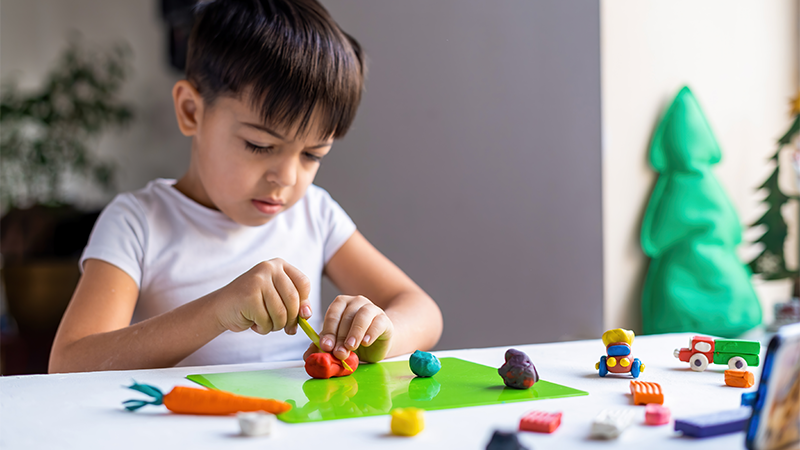Early childhood is a pivotal stage for cognitive development, the foundation upon which a child’s future learning is built. This phase is characterized by rapid growth in language, memory, problem-solving skills, and perception.
Cognitive development for preschoolers refers to the remarkable process of a child’s brain shaping thoughts, processing information, tackling problems, and assimilating new skills. This multifaceted domain encompasses various mental abilities, from attention and perception to memory and language. It serves as the canvas upon which a child paints their understanding of the world.As the best preschool in Bangalore, in this blog, we are sharing 10 simple activities to boost cognitive development that you can try with your child at home to help them learn and grow.
The Importance of Structured Activities for Cognitive Development
Structured activities give children a sense of routine and purpose. They are designed to promote critical thinking, improve concentration, and enhance problem-solving skills. By offering these activities for cognitive development, you ensure that your child’s brain is being challenged in a fun and meaningful way.
Activities to Boost Cognitive Development in Early Childhood
1.Puzzles and Brain games
Puzzles and brain games are excellent for enhancing problem-solving skills and spatial awareness. Whether it’s a jigsaw puzzle, a Rubik’s cube, or a simple matching game, these activities require children to think critically and strategically.It’s a fun way to keep their minds active and growing.
2. Interactive Storytelling
Encourage your child to listen to stories or tell their own. It enhances language skills, strengthens memory, and stimulates imagination.
3. Building Blocks
Playing with blocks helps kids learn about balance, how things are built, and how to coordinate their movements. It also encourages creativity as they explore new ways to build and create. Building with blocks hones spatial skills and understanding of fundamental physics concepts.
4. Memory Games and activities
Memory games are a great way to help children develop important skills in a fun and engaging way. From a young age, memory games can help children learn how to remember, recognize and recall information in an enjoyable manner. Not only do they promote cognitive development, but they also help to improve concentration, creativity and problem-solving skills.
5. Role Play and Pretend Games
Roleplay and pretend games allow children to act like different characters or situations. This fun activity boosts their creativity and helps them develop social and thinking skills as they learn to understand real-life scenarios. It helps them improve their decision making abilities too.
6. Sensory Play
Sensory play is important for cognitive development because it helps children build nerve connections in their brains, which are essential for more complex learning. Sensory play involves activities that engage multiple senses, such as touch, smell, taste, sight, and hearing.These experiences stimulate different senses, allowing children to explore and learn about the world around them through their senses
7. Arts and Crafts
Art and craft activities, such as drawing, painting, and sculpting , help children improve their fine motor skills. It also improves their hand-eye coordination and stimulates the brain.These learning activities for preschoolers also boost creativity and help kids concentrate better.
8. Music & movement and Rhythm Games
Music and movement activities, such as dancing or playing musical instruments, can significantly boost cognitive development. These activities help children develop rhythm, coordination, and auditory skills.Singing and clapping along to rhythms helps children improve their memory and coordination. It also boosts their ability to recognize patterns and supports their emotional and language development.
9. Outdoor Play and Nature Exploration
Nature walks and outdoor activities inspire children’s curiosity and help them notice details in their surroundings. These experiences also boost their physical coordination and allow them to explore and discover the world around them. This kind of hands-on learning is crucial for developing critical thinking and problem-solving skills.
10. Simple Science Experiments
Hands-on science experiments, such as mixing colors or watching plants grow, show children how one action leads to another. These activities help kids develop critical thinking skills as they learn about cause and effect. It’s the cornerstone of problem-solving and informed decision-making.
The Role of Parents in Cognitive Development
- Engage in activities regularly: Participate in learning activities for preschoolers to make learning more interactive and fun.
- Create a nurturing environment: A warm, stimulating environment helps in healthy cognitive development.
- Encourage exploration: Allow children to explore the world around them to boost curiosity and problem-solving skills.
- Provide positive reinforcement: Encourage progress and celebrate small achievements to build confidence.
Conclusion
In conclusion, cognitive development plays a key role in shaping a child’s ability to learn, understand, and think critically. Through these structured activities for cognitive development, you can give your child the tools they need to succeed.
At Chrysalis Kids, the best play school in Bangalore, we believe in blending fun with learning, creating an environment that’s ideal for young minds. Enroll your child at Chrysalis Kids now and give them the gift of a strong foundation in cognitive development!
